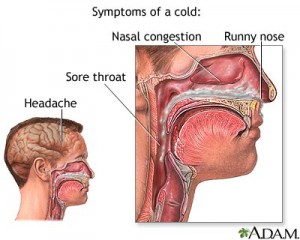
Some people still encounter the last period of a cold season. I was lucky, didn’t get impacted, probably because staying clean wash my hand, doesn’t meet much or in contact much physically with people. For others, many I known, having a cold can destroy quality of life, day to day basis.
Symptoms
Cold symptoms usually occur within 2 or 3 days after you came in contact with the virus, although it could take up to a week.
Symptoms mostly affect the nose.
The most common cold symptoms are:
Nasal congestion
Runny nose
Scratchy throat
Sneezing
Adults and older children with colds generally have a low fever or no fever. Young children often run a fever around 100-102°F.
Depending on which virus caused your cold, you may also have:
Cough
Decreased appetite
Headache
Muscle aches
Postnasal drip
Sore throat
——————————————————–
Treatment
Get plenty of rest and drink plenty of fluids.
COLD MEDICINES
Over-the-counter cold and cough medicines may help ease symptoms in adults and older children. They do not make your cold go away faster, but can help you feel better.
Over-the-counter (OTC) cough and cold medicines are not recommended for children under age 6. Talk to your doctor before giving your child any type of over-the-counter or nonprescription cough medicine, even if the label says it is made for children. These medicines likely will not work for children, and may have serious side effects.
ANTIBIOTICS
Antibiotics should not be used to treat a common cold. They will not help and may make the situation worse. Thick yellow or green nasal discharge normally occurs with a cold after a few days. If it does not get better within 10 to 14 days, then your doctor may prescribe antibiotics.
OTHER MEDICINES
Newer antiviral drugs used to relieve flu symptoms do not help reduce cold symptoms.
ALTERNATIVE TREATMENTS
Alternative treatments that have been used for colds include:
Chicken soup
Vitamin C
Zinc
Echinacea
Chicken soup has been used for treating common colds for centuries. It may really help. The heat, fluid, and salt may help you fight the infection.
Vitamin C is a popular remedy for the common cold. Research shows it does not prevent colds in many adults, but people who take vitamin C regularly seem to have slightly shorter colds and milder symptoms. Taking vitamin C after your have a cold doesn’t seem to be helpful.
Zinc supplements taken for at least 5 days may reduce your risk of catching the common cold. Taking a zinc supplement within 24 hours of when you first feel sick may make your cold symptoms less severe and help them go away faster.
Echinacea is a herb that has been promoted as a natural way for preventing colds and the flu, and for making symptoms less severe. However, high-quality studies have failed to show that this herb helps prevent or treat colds.
Alternative treatments are safe for most people. However, some alternative treatments may cause side effects or allergic reactions. For example, some people are allergic to echinacea. Herbs and supplements may also change the way other medicines work. Talk to your doctor before trying an alternative treatment.